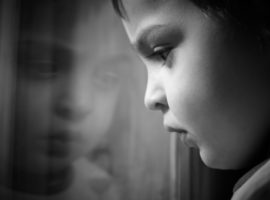When the parents of David Turpin learned that he and his wife Louise had been allegedly torturing their 13 children, they were “surprised and shocked,” because their son and daughter-in-law were “a good Christian family.”
We hear it time and time again. People express shock and disgust that parents who appear to be religious have been abusing their children.
In the horrific case of the Turpin family, police found the 13 children, ages 2 to 29, shackled to furniture, severely malnourished and pale, living in filth, and injured. Many appear to have cognitive issues and nerve damage, a result of abuse. The children were so thin, police drastically miscalculated their ages; they thought a 17-year-old girl was only 10.
According to the children’s grandparents, James and Betty Turpin who live in West Virginia, David and Louise had so many children because “God called on them” to do so. James and Betty thought that the children had appeared thin and were aware that they had been given “very strict homeschooling,” Also, the grandparents said the children had been trying to memorize long passages of the Bible. Some even had been trying to memorize it in its entirety.
The grandparents hadn’t seen the home-schooled children in 4 or 5 years. But based on what they knew and had observed, did nothing stand out as a red flag? Were they not at all concerned about the way the parents were raising their children? Or were they satisfied just knowing that the children were being raised in the Christian faith?
Neighbors interviewed in the suburban neighborhood of Perris, California, wondered why they rarely saw the children. Some admitted that a few looked malnourished and pale. When one neighbor saw the children putting up a nativity scene, she witnessed bizarre behavior: The children “froze [as] if by doing so they could become invisible.” And yet no one put in a call to police or CPS?
We need to reconsider our roles as neighbors, relatives, and community members when it comes to protecting children who are not our own offspring—even if the parents appear to be religious.
Of course, stepping into someone else’s private space to report them to authorities is not easy. (Although keep in mind you don’t have to prove abuse to make such a call.) Coming to the aid of a child who is in distress also is unnerving. I will never forget when I was in line at the post office and I had to beg a woman to pick up her baby who had been screaming for 15 minutes, his face beet red. I was verbally attacked by a stranger who thought what I had done was unconscionable. That was not fun, but at least, for that moment, things were better for the baby because the mother did pick up the baby and the crying ceased.
I’ve heard all the excuses. “It’s not our place to interfere with another parent’s choice.” “You could cause even more trouble for the child.” “The parent knows what she’s doing.” But let’s be honest. Most people don’t want to assume the role of protector for the simple reason that it’s uncomfortable, embarrassing, and a little scary.
The time has come for us to realize it’s not about us. Maybe if the Turpins’ relatives or neighbors had taken their roles as child protectors more seriously, those children would not have endured what they did.
David and Louise Turpin have been charged with dozens of counts of torture and abuse. The father was also charged with sexually abusing one of his daughters.
Incidentally, you may wonder just how the children were saved. It turns out the 17-year-old girl who police thought was so much younger had escaped through a window and called 911 form a deactivated a cell phone.
Her siblings owe their sister their lives. But it shouldn’t have been that way. We shouldn’t have to rely on children to save themselves. That’s our job.
Janet Heimlich is an award-winning journalist and author of the book, Breaking Their Will: Shedding Light on Religious Child Maltreatment. She founded and sits on the board of the Child-Friendly Faith Project.
Do you know of a religious organization that isn’t taking child abuse or neglect seriously? Or is your place of worship doing great things for children? Please let us know your questions, concerns, and ideas by emailing us at [email protected].

